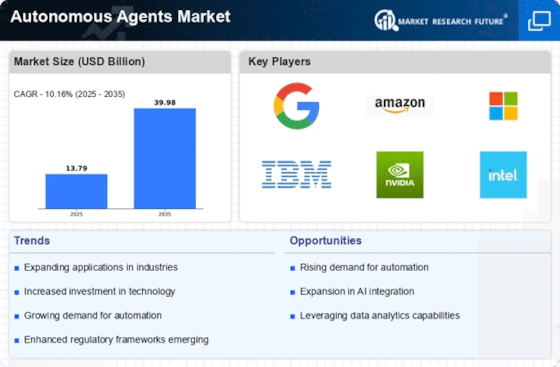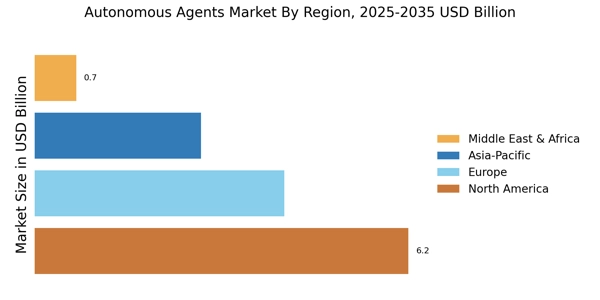Rising Consumer Expectations
Rising consumer expectations are shaping the Autonomous Agents Market as businesses strive to meet the demands for enhanced service delivery and personalized experiences. Consumers increasingly expect seamless interactions and instant responses, prompting companies to adopt autonomous agents for customer service and support. The use of chatbots and virtual assistants has become commonplace, with Market Research Future indicating that over 70% of consumers prefer interacting with automated systems for basic inquiries. This shift in consumer behavior is likely to drive further investment in autonomous technologies, as organizations seek to improve customer satisfaction and loyalty. Consequently, the Autonomous Agents Market is poised for growth as businesses adapt to these evolving expectations.
Advancements in AI Technology
The Autonomous Agents Market is experiencing rapid advancements in artificial intelligence technology, which is driving the development of more sophisticated autonomous agents. These agents are increasingly capable of performing complex tasks, learning from their environments, and making decisions with minimal human intervention. The integration of deep learning algorithms and neural networks enhances their efficiency and effectiveness. According to recent estimates, the AI market is projected to reach a valuation of over 500 billion dollars by 2024, indicating a robust growth trajectory. This surge in AI capabilities is likely to propel the Autonomous Agents Market forward, as businesses seek to leverage these technologies for automation and improved operational efficiency.
Growing Investment in Robotics
Investment in robotics is a prominent factor influencing the Autonomous Agents Market. As companies recognize the potential of autonomous agents to transform operations, funding for robotics research and development has surged. In recent years, venture capital investments in robotics startups have reached unprecedented levels, with billions of dollars allocated to innovative projects. This influx of capital is expected to accelerate advancements in autonomous technologies, leading to the creation of more capable and versatile agents. Furthermore, government initiatives aimed at promoting robotics and automation are likely to bolster the market, as public and private sectors collaborate to drive innovation and enhance competitiveness in the Autonomous Agents Market.
Increased Demand for Automation
The demand for automation across various sectors is a key driver of the Autonomous Agents Market. Industries such as manufacturing, logistics, and healthcare are increasingly adopting autonomous agents to streamline operations, reduce costs, and enhance productivity. For instance, the logistics sector is projected to witness a significant increase in the use of autonomous delivery agents, with market estimates suggesting a growth rate of over 20% annually. This trend reflects a broader shift towards automation, where businesses are looking to optimize processes and minimize human error. As organizations recognize the potential benefits of autonomous agents, the market is likely to expand, creating new opportunities for innovation and investment.
Expansion of Internet of Things (IoT)
The expansion of the Internet of Things (IoT) is significantly impacting the Autonomous Agents Market. As more devices become interconnected, the potential for autonomous agents to operate within these networks increases. IoT-enabled environments provide autonomous agents with real-time data, enabling them to make informed decisions and respond to changing conditions. This synergy between IoT and autonomous agents is expected to enhance operational efficiency across various sectors, including smart homes, industrial automation, and urban infrastructure. Market analysts predict that the IoT market will surpass 1 trillion dollars by 2025, further driving the adoption of autonomous agents and creating new avenues for growth within the Autonomous Agents Market.

















